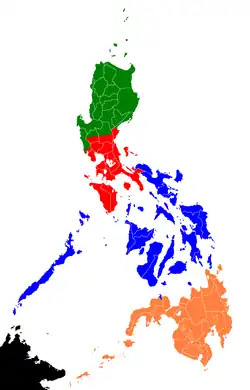The super regions of the Philippines are an informal and de facto defunct grouping of parts of regions and provinces of the Philippines based on their economic strengths.[1] According to Executive Order No. 561, which establishes these regions,
"[These] groupings neither supersede current political boundaries nor alter the regional development councils as established by existing laws and issuances."
The creation of super regions was first proposed by the President Gloria Macapagal Arroyo in her sixth State of the Nation Address to group the selected regions/provinces by their economic strengths.[2] Each super region is headed by a Development Champion.[1]
Composition

North Luzon Agribusiness Quadrangle
- Ilocos Region
- Cordillera Administrative Region
- Cagayan Valley
- northern portion of northern provinces of Central Luzon
- Aurora (north of Baler)
- Nueva Ecija (north of Cabanatuan)
- Tarlac (north of Tarlac City)
- Zambales (north of Subic)
Metro Luzon Urban Beltway
or simply Luzon Urban Beltway.
- the rest of Central Luzon
- Aurora (south of Baler, including Baler)
- Bataan
- Bulacan
- Nueva Ecija (south of Cabanatuan, including Cabanatuan)
- Pampanga
- Tarlac (south of Tarlac City, including Tarlac)
- Zambales (south of Subic, including Subic and Olongapo)
- National Capital Region
- Calabarzon
- Mimaropa (excluding the provinces of Palawan and Romblon)
Central Philippines Region
also known as Tourism Super Region.
- the rest of Mimaropa
- Bicol Region
- Western Visayas
- Central Visayas
- Eastern Visayas
- Northern Mindanao
- Caraga
The Tourism Super Region is a concept of development plan of the government. Under this concept, the government intends to focus development and investments on tourism related projects. This super region is actually a cluster of five regions plus some parts of Caraga. It boasts of a wide stretch of beachline, surfing spots, caves, lakes, and historical sites.
Included in the plan is building the infrastructures such as airports, roll-on-roll-off seaports, bus terminals and hotels. Aside from Mactan–Cebu International Airport, the government intends to build international airports in each component region. The Bohol–Panglao International Airport in Bohol in Central Visayas and the Bicol International Airport in Daraga, Albay for the Bicol Region has opened in 2018 and 2021, respectively, while the unutilized Guiuan Airport in Guiuan, Eastern Samar is being planned to be converted into an international airport for Eastern Visayas region. The Kalibo International Airport in Aklan is now open to international flights from Incheon, South Korea due to increasing Korean tourists flocking to Boracay Island. The Bacolod–Silay International Airport in Silay is designated to serve Negros Occidental and Negros Oriental, while the new Iloilo International Airport in Cabatuan, Iloilo, is designated as the international airport for Panay Island together with Kalibo Airport.
Mindanao Super Region
also known as Agribusiness Mindanao Super Region.
- Zamboanga Peninsula
- Northern Mindanao (except for Camiguin)
- Davao Region
- Soccsksargen
- Caraga (except for Siargao)
- Bangsamoro Autonomous Region in Muslim Mindanao
Cyber corridor
The cyber corridor traverses the above super regions from Tuguegarao to Davao City.
See also
References
External links
- ABS-CBN Interactive ABS-CBN news about the super regions
- North Luzon Super Region: Potentials
- North Luzon Super Region: Projects